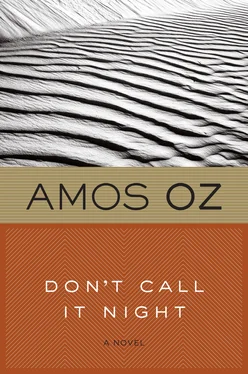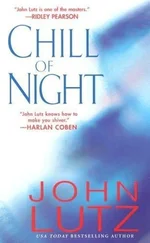Me, Theo said, well, it's like this, and instead of continuing he suddenly raised his undershirt and drew my head inside and enfolded me in the dark hairy cave of his chest as if he were pregnant with me.
WHILE the six o'clock news was on I made a fruit salad. I sniffed the carton of milk in the refrigerator, suspicious as usual both of the milk and of my own sense of smell. Then I started to tidy the kitchen cabinets, from right to left. I hoped she would come back early. Just before seven I went out on the balcony to see how the day was receding. A strange grey dog slowly crossed the garden and disappeared behind the bougainvillaea bower, swaying as though it had been knocked out. There is the dark stone wall between the garden and the desert. And behind the wall and the two cypresses turning black with the evening come the barren hills — not so much hills as notes from a muffled tune. In fact the muffled tune was someone playing a recorder in a neighbouring apartment, not a whole tune but simple scales repeated apparently without any variation. Six times the elevator passed our floor without stopping. I remembered she had a meeting at Muki's Linda's apartment this evening. I decided to go out. To go down and see what there is in the wadi, or perhaps, instead, to go down to the square and take a look at the Alsatian puppy that Kushner the bookbinder wants to give us.
The end of June. The days are very long. The nights are dry and chilly. Outside the front door some youngsters were sitting on a low wall, and they whispered together as I went past as if they had noticed something funny. The one and only police patrol car in Tel Kedar went past me and slowed down without its flashing light. The policeman waved to me and smiled: Evening, Sombrero, why don't we ever see you? And a sudden breeze blew from the end of the street making a low whistling sound. I started the Chevrolet and drove straight to the place the sound came from. There are only nine apartment blocks on the street and straight after the last one the road turns into a rutted dirt track which you can follow, if you like, southwards, then south-eastwards as far as the entrance to the quarries. Once I was out on the plateau I realized that the wind was actually much stronger than it had seemed among the buildings: it was not a gentle breeze but sharp gusts whose roar I could hear above the sound of the tires on the gravel. It was hard to make out the track through the dust that was caught in the headlights and whirled around me, like driving in a snowstorm. Too late I remembered to close the windows of the car. I continued groping my way forward, at a snail's pace, trying to guess from the billows of dust where the slope of Hyena Hill was and where, on my right, was the edge of the wadi. Grains of fine sand whirled across my entire field of vision in their millions until even the sharp horizon dividing the desert from the sky was obliterated. It was like crossing a virgin forest in the middle of the night. I supposed that the dark smudge on my left was the lower slopes of the mountain range and I advanced slowly parallel to it while the westerly wind, from my right, lashed the windows with sand. The headlight beams were broken up by the dust and reflected back dazzlingly into my eyes, as if I were driving in thick fog. The car lurched and bounced about and I realized that it had left the dirt track to the quarries and that from now on I would have to try at least to stay on a parallel course to it on the flat scree at the foot of the cliff. The darkness deepened. I tried driving with full beam, dipped headlights, sidelights, but still the dust continued to break up the light and reflect it back to me beaten, soaked in murky sand.
I decided it was best not to go on. I stopped the engine, got out, and stood waiting for the cloud raised by the tires to settle, but after a while I was still surrounded by thick, soup-like air. I had lost my way. Nevertheless I thought I could vaguely identify the line of cliffs to the left. I started the engine and decided to get a little closer to it and drive along it until it brought me to the electronic fence that the army had put up along the mouth of the forbidden valley, and that would certainly guide me to the curve of the quarries. A low cloud or a tall pillar of dust barred the sky from my eyes. I was struck by a strange feeling, as though I were moving not forward but up and down, swinging in a sealed box deep under the ocean. I enjoyed this feeling until my eyes almost closed, in fact they may have closed altogether as I could see nothing anyway except the convulsive dancing of the dazzling wall of dust in front of my headlights. I considered for a moment whether I was not better off stopping here, lying down on the ground and waiting. On second thoughts I could not see what change might be worth waiting for. I took account of the danger involved in proceeding, as there were some fairly deep gullies that bisected the plain, but I answered myself, Never mind, I can still press on slowly and steadily. So I drove on gently in bottom gear, at 5 miles an hour or less. Stone chips and gravel groaned and grumbled under the weight of the moving wheels. Could I have unwittingly passed the quarries already? Or could I have drifted into the forbidden valley? There was nothing to stop me turning round and trying to drive back. But there was no point in turning round and nowhere to go, because the car's tracks were immediately obliterated by the eddies of windswept sand. Better keep moving southwards, if it really was southwards, until my tires splashed into the Indian Ocean or until at least I managed to fall asleep, and sink down into the depths of that sleep that had abandoned me but still went on calling to me like a will-o'-the-wisp.
Then I made out beyond the murky screen a pale flickering light, the barrier at the entrance to the quarries. I flashed my headlights to the guard, so as not to alarm him, but after a moment I realized that it wasn't the gate to the quarries: what I had done was to drive right round the south side of the town and now I was entering it again from the west, on Ben Zvi Street, in the chic residential neighbourhood. Now there was a paved road surface under my tires, a row of streetlights, and the wall of dust dissolved. I could see tiled roofs, and darkened trees in the gardens. The eerie sound of muffled woodwind music had faded too. The dim silvery expanse and the carpet of ashes had vanished. I felt a momentary urge to turn round and drive back into the fog from which I had come. But what for? So I drove past four identical houses that looked as though they were inspired by an illustration in an old-fashioned children's book: simple, square houses with chimneys, built of red bricks and with symmetrical windows on each side of the door. I parked the Chevrolet outside the fourth house, behind Batsheva's battered Subaru; I got out and, without bothering to lock the cat, rang the doorbell. I rang three times, at intervals, but answer came there none, even though there was a friendly little light in the window on the left and I fancied I could hear a faint sound of music coming from somewhere inside the house.
Undeterred, I made my way round the side of the house along a dark paved path almost canopied with wild oleanders. At last I came upon Batsheva in the garden at the back. She and her old mother were sitting enjoying their evening peace by the yellowish glow of a light bulb suspended in the branches of a fig tree. The old woman sat motionless on a stool, erect and ascetic-looking, with a green kerchief on her head and her shrivelled arms held stiffly in front of her on her knees. Batsheva was playing a mouth organ, and this was the melancholy tune I had heard when I pressed the doorbell. She was sitting sprawled in an old claret-coloured armchair with splayed legs that had no doubt once adorned an oriental-style drawing room. Now that the upholstery was worn thin and the stuffing was spilling out in several places, the chair had been consigned to the garden like a magnificent pleasure cruiser grounded on a sandbank. Both their heads were ringed about with brightly lighted moths, and I knew that if I lingered here my head too would be surrounded with a similar shimmering halo.
Читать дальше












